by Emilio Jaksetic
Facebook has placed a 30-day ban on posting by State Senator Amanda Chase, R-Chesterfield. Facebook’s ban is an act of naked political censorship and an assault on the liberties of all Virginians.
Chase is a Virginian politician who often expresses controversial views that trigger strong, visceral reactions. Virginians are free to like, dislike, or ignore Chase’s political statements. The merits (or lack thereof) of Chase’s political statements are irrelevant to the threat to liberty posed by Facebook’s censorship of her.
Like her, hate her, or ignore her — don’t let your opinion of Chase blind you to the significance of Facebook’s action against her. If Facebook can unilaterally ban Chase, then it can unilaterally ban any Virginian it dislikes or disagrees with, for whatever reason Facebook chooses.
Freedom of speech and freedom of association are not just for people we like or agree with. They are precious freedoms for all Americans, even those we strongly dislike or disagree with. In a famous dissent in Abrams v. United States (1919), Supreme Court Justice Oliver Wendell Holmes, Jr. noted the importance of allowing free speech to people we strongly disagree with:
But when men have realized that time has upset many fighting faiths, they may come to believe even more than they believe the very foundations of their own conduct that the ultimate good desired is better reached by free trade in ideas-that the best test of truth is the power of the thought to get itself accepted in the competition of the market, and that truth is the only ground upon which their wishes safely can be carried out. That at any rate is the theory of our Constitution. It is an experiment, as all life is an experiment. Every year if not every day we have to wager our salvation upon some prophecy based upon imperfect knowledge. While that experiment is part of our system I think that we should be eternally vigilant against attempts to check the expression of opinions that we loathe and believe to be fraught with death, unless they so imminently threaten immediate interference with the lawful and pressing purposes of the law that an immediate check is required to save the country.
In NAACP v. Alabama (1964), the U.S. Supreme Court struck down the effort to bar the NAACP from operating in the State of Alabama. In that decision, the Supreme Court noted the important relationship of freedom of association and free speech:
It is beyond debate that freedom to engage in association for the advancement of beliefs and ideas is an inseparable aspect of the `liberty’ assured by the Due Process Clause of the Fourteenth Amendment, which embraces freedom of speech.
No one elected Facebook to unilaterally decide what Virginians are free to post, read or ignore. No one elected Facebook to control and filter free speech and political debate in Virginia. No one elected Facebook to manipulate social media to impose its own political views on Virginians. No one elected Facebook to interfere with Virginians’ constitutional rights to free speech and freedom of association. No one elected Facebook to presume that it knows better than Virginians themselves how to exercise their freedom of speech and their freedom to choose what they read or ignore.
Virginians who ignore Facebook’s assault on free speech and freedom of association risk suffering similar censorship by Facebook in the future.
Virginians who applaud Facebook’s assault on free speech and freedom of association are missing the point that they are giving approval to unilateral censorship by an unelected, unaccountable entity that arbitrarily decides what is appropriate or not for social media.
Facebook is a private entity, not a governmental entity. But the audacity of Facebook’s unilateral censorship poses a serious threat to the liberties of Virginians that will only grow if it continues unchallenged.
Emilio Jaksetic, a retired lawyer, is a Republican in Fairfax County.



